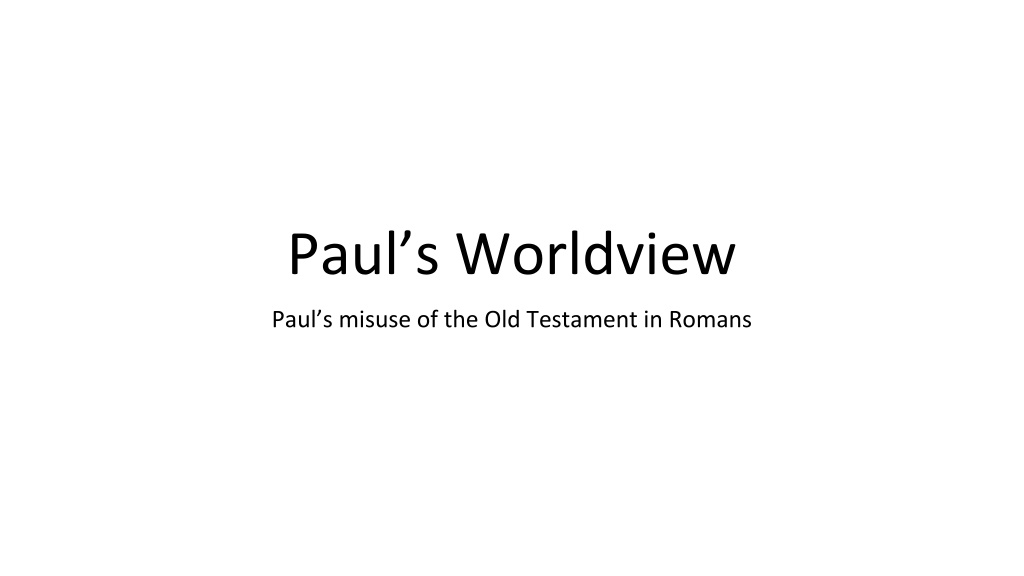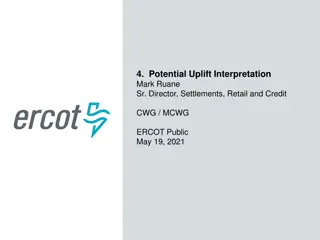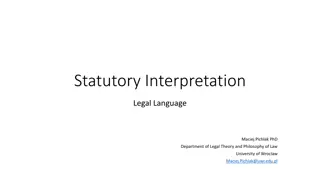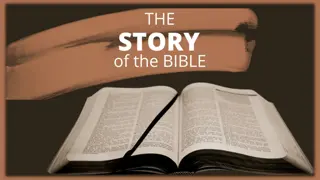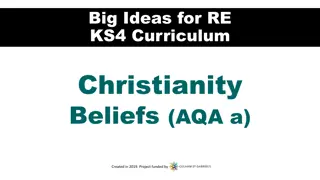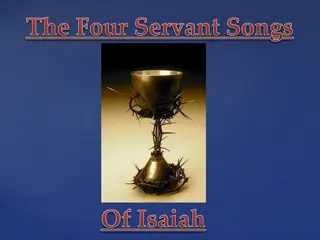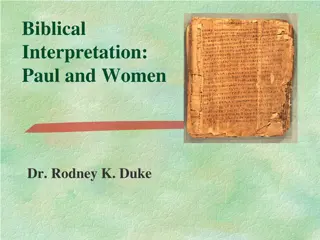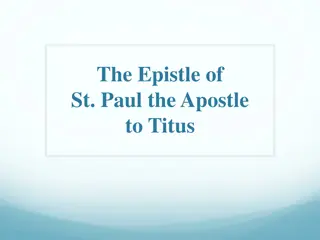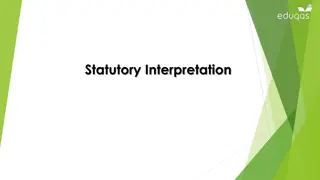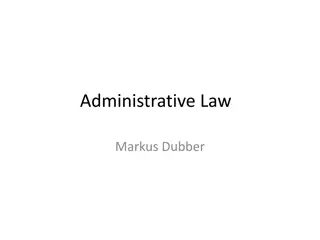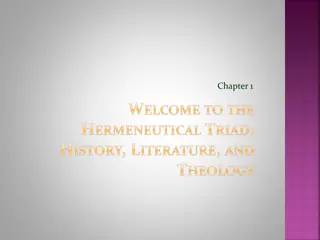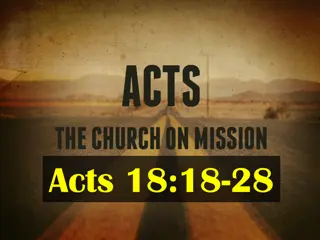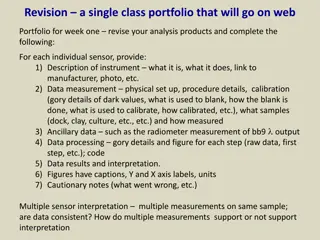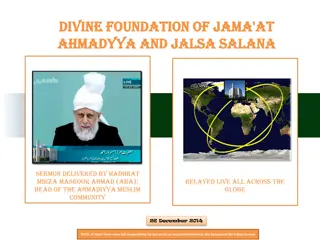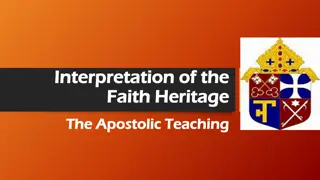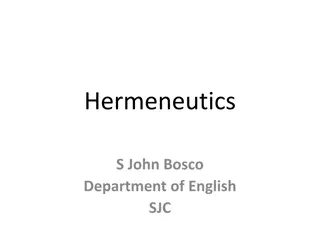The Interpretation of Messiah in Paul's Worldview
Paul's interpretation of the Old Testament in Romans is discussed regarding the portrayal of Jesus as Messiah. Scholars debate the alignment between the OT and NT perspectives on Messiah, exploring hermeneutics and biblical interpretation methods. The significance of understanding the Hebrew Bible's portrayal of the Messiah is highlighted for evangelical scholarship and Church beliefs.
Download Presentation

Please find below an Image/Link to download the presentation.
The content on the website is provided AS IS for your information and personal use only. It may not be sold, licensed, or shared on other websites without obtaining consent from the author. Download presentation by click this link. If you encounter any issues during the download, it is possible that the publisher has removed the file from their server.
E N D
Presentation Transcript
Pauls Worldview Paul s misuse of the Old Testament in Romans
A FEW THOUGHTS TO GET STARTED Disclaimer: I am not a Jew! Newsflash: Jesus and Paul were Jews! Homework: What does messiah mean to you?
SUMMARY Jesus as Messiah Many scholars, including those who claim to be evangelical, believe the NT portrayal of Jesus as Messiah is basically foreign, or goes creatively beyond, what the OT says about Messiah (mashiach). Trying to build a messianic profile on just the word mashiach is problematic and at the heart of the notion that the OT messiah does not align with the NT Jesus.
SUMMARY Hermeneutics Another issue is the way many bible students, including scholars, approach both the OT and NT from a hermeneutic standpoint. Hermeneutics is the science and art of biblical interpretation.
QUESTION How do you interpret the bible? How did you arrive at your current understanding of biblical text? Reading the bible on your own? Using concordances/word studies/cross referencing scripture? Reading books other than the bible? Formal education? Parent, Preacher, Sunday School Teacher? Google? Podcasts? Biblical software?
Hermeneutics Defined The interpretation of language, whether written or spoken. The name for the philosophical discipline concerned with analyzing the conditions for understanding. Hermeneutic philosophers examine how our cultural traditions, our language, and our nature as historical beings make understanding possible. The primary need of hermeneutics is to determine and understand the meaning of Biblical text. The purpose of hermeneutics is to bridge the gap between our minds and the minds of the biblical writers through a thorough knowledge of the original languages, ancient history and the comparison of scripture with scripture.
"Messiah and the Hebrew Bible" John Sailhamer In a recent book review from the Journal of Evangelical Theological Society, Walt Kaiser has made a strong plea for the importance of the question of the Messiah and the Hebrew Bible. The question, says Kaiser, could be a defining moment for evangelical scholarship and ultimately for the Church s view of the way we regard Scripture. According to Kaiser, the question ultimately comes down to whether the NT interpretation of an OT text is, in fact, the meaning intended by the OT author. Kaiser states, ...if it is not in the OT text, who cares about how ingenious later writers are in their ability to reload the OT text with truths that it never claimed or revealed in the first place? The issue is more than hermeneutics, says Kaiser. The issue is that of the authority and content of revelation itself!
The Issue So, the question is if we did not have the NT, what would we discover about messiah in the OT? AND What did first century folks know about messiah?
Hebrew Bible Quick Facts Concerning Messiah Hebrew Noun: mashiach anointed one Occurs 39 times in the Hebrew Bible Hebrew Verb: mashach "to anoint or smear" Occurs 69 times in the Hebrew Bible Primary reference is to a ruling king but also priests and prophets Yahweh s representatives for His chosen people The king is the Lord s anointed (never in the absolute: the anointed one )
Jewish Concept of Messiah "Jews For Judaism" Mashiach translated anointed refers to a person initiated into Yahweh's service by being anointed with oil. There are many Messiahs in the HB since every King and High Priest was anointed with oil. 1 Samuel 26:11. The Hebrew word "HaMashiach" ("the" Messiah) describing a future anointed person to come does not appear anywhere in the HB and not considered a critical concept as in Christanity. The Jewish concept of Messiah is one of the central themes of Biblical prophecy of the promise of a future age of perfection characterized by universal peace and recognition of Yahweh. Isaiah 2:1-4
Jewish Concept of Messiah "Jews For Judaism" Many prophetic passages speak of a descendant of King David who will rule Israel during the age of perfection. Jeremiah 23:5-6 Since every past King is a Messiah, by convention, the "future" anointed one from the Davidic descent is referred to as "The Messiah" and will be recognized as Messiah by seeing who the King of Israel is at the time of complete universal perfection. The HB never speaks about believing in the Messiah. Because his reign will be an historically verifiable reality, self-evident to any person, it will not require belief or faith. Because no person has ever fulfilled the picture painted in the HB of this future King, Jewish people still await the coming of the Messiah. All past Messianic claimants, including Jesus of Nazareth have been rejected.
Jewish Concept of Messiah "Jews For Judaism" The claim that Jesus will fulfill the Messianic prophesies when he returns does not give him any credibility for his "first" coming. The HB never speaks about the Messiah returning after an initial appearance. The "second coming" theory is a desperate attempt to explain away Jesus' failure. According to Biblical tradition, Elijah the prophet will reappear before the coming of the Messiah (Malachi 4:5-6). In the Greek Testament, Jesus claims that John the Baptist was Elijah (Matthew 11:13-14). However, when John the Baptist was asked if he was Elijah, he denied it (John 1:21). According to the HB, the Messiah must be a descendent of King David. Although the Greek Testament traces the genealogy of Joseph back to David, it then claims that Jesus resulted from a virgin birth and that Joseph was not his father.
Jewish Perspective Belief in the eventual coming of the mashiach is a basic and fundamental part of traditional Judaism and part of the thirteen principles of faith as compiled and composed by Rabbi Moshe ben Maimon, or Rambam in the 12thcentury. The thirteen principles of faith are included in every Jewish prayer book and are recited as a liturgical hymn at the conclusion of a Friday or Festival service. This recitation is known as the Yigdal and embodies Judaism s fundamental pillars of traditional belief. Even though there may not be complete agreement among Jewish scholars of all the concepts as stated in the thirteen principals, there appears to be strong acceptance within Judaism as a whole.
Jewish Perspective Modern scholars suggest that the messianic concept was introduced later in the history of Judaism during the age of the prophets and not explicitly anywhere in the Torah. However, traditional Judaism maintains that the messianic idea has always been a part of Judaism and not mentioned in the Tora because the Torah was written in terms that all people could understand, and the abstract concept of a distant, spiritual, future reward was beyond the comprehension of some people.
Jewish Perspective The word Mashiach does not mean savior as in the notion of an innocent, divine or semi-divine being who will sacrifice himself to save us from the consequences of our own sins. That would be purely a Christian concept that has no basis in Jewish thought.
Rambam 13 Principals of Faith 1) The Creator alone made, makes, and will make all that is created. 2) The Creator is a Unity, and there is no union in any way like Him. He alone is our God, who was, who is, and who is to be. 3) The Creator is not a body, is not affected by physical matter, and nothing whatsoever can compare to Him. 4) The Creator is the first and is the last. 5) The Creator to Him alone is it fitting to make prayer and to another prayer shall not be made. 6) All words of the prophets are true.
Rambam 13 Principals of Faith 7) The prophesy of Moses our teacher was true and he was the father of all prophets that preceded him as well as all that came after him. 8) The whole Torah now found in our hands was the exact same one given to Moses. 9) This Torah shall not be changed and it shall not be replaced with another from the Creator. 10) The Creator knows every action done by each human being as well as all their thoughts.
Rambam 13 Principals of Faith 11) The Creator rewards all who keep His commandments and punishes all those who transgress His commands. 12) I believe by complete faith in the coming of the Messiah, and even though he tarry in waiting, in spite of that, I will wait expectantly for him each day that he will come. 13) I believe in complete faith that there will be a resurrection of the dead at the time that will be pleasing before the Creator and the remembrance of Him will be exalted forever and all eternity.
Question Our Assumptions All Jews thought the same way about Scripture both then and now. There has always been just one Judaism. There has never been any interpretive variety in Judaism.
So What About Paul? Paul was keenly aware of both what the HB "said" and the variations of thought and debate as to "meaning". Paul was a second temple Jew influenced by other sources of the time such as Josephus and Enoch. Paul did not come to know Jesus as Messiah over a long period of time or through traditional teaching. Paul came to understand Jesus as Messiah in the twinkling of an eye through miraculous intervention. After his conversion, Paul viewed Scripture through the lens of the resurrected Jesus.
Messianic Mosaic Yahweh telegraphs His salvation plan over time. His plan includes more than restoring peace for Israel. His plan is part of a bigger plan to restore Eden to its original intent and fullness. Messiah in the OT is just one part of the progressing messianic profile that will come to fullness with the birth, death, and resurrection of Jesus. Yahweh s messianic mosaic is not created with just one word, it is created with lots of different words, concepts and events throughout His story.
Mashiach Use of mashiach in Hebrew OT (39 times) points specifically to kings, priests and prophets as anointed by God for His service or purposes. Most notable is the Davidic Covenant in 2 Samuel 7 which is the promise made by Yahweh that He would establish for King David a house or a dynasty of anointed kings who would perpetually reign over God s chosen people. Less notable is Cyrus, king of Persia, in Isaiah 45. God declares Cyrus to be His anointed one and uses Cyrus to bring His chosen people out of exile. And he is not even a Jew!
Mashiach There are elements of anointed kings that would be affirming and some deflating with what we actually see in Jesus. Critics contend mashiach is used of historic kings, priests and prophets of the past and are not ideal for a "future" grand deliverer with a divine nature as well as human dynasty. Mashiach is just used of individuals of the past who are part of the OT story that comes to an end and does not point to a divine messiah who is going to die for the sins of the nations and rise again. Which is partially true if you only consider the word "mashiach".
History or HIS-STORY The Hebrew Bible Mashiach does not tell the full story. Yahweh is writing a bigger and intentional progressive story. Yahweh is always active and moving through history. Yahweh used these historical Mashiach to paint part of His story. And what is the story about ? Restoring Eden through His chosen people Israel. And when messiah pops up in the story it is to service or promote that story of rescuing the world through Israel as God promised Abraham.
What Next? Over the next several weeks we will see how God s story progresses through the OT into the NT. How messiah language pairs with Davidic language that pairs with sonship language and kingship language and servant language and branch language . We will see how all of these concepts begin to merge into one plot. If you just focus on messiah language you will not be able to connect all the dots. It is not about picking the OT apart, but seeing the whole narrative. It is a really big deal when Paul refers to Jesus of Nazareth as Christ Jesus which is literally Jesus the Messiah.
